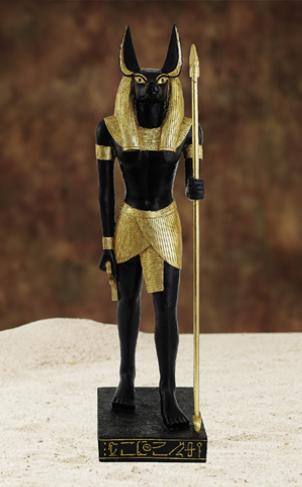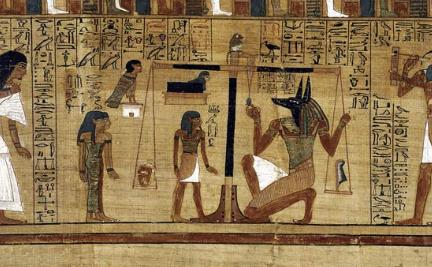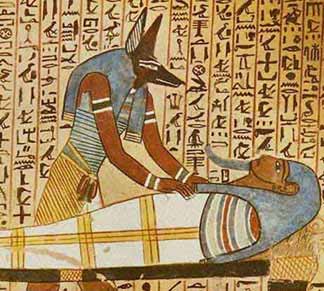
Anubis
Anubis, who the ancient Egyptians called Ienpw (phonetically "Yinepu"), is the mysterious canid funerary deity of ancient Egypt. Even the meaning of his name is unknown -- speculations range from "Royal Child" to having derived from the world for "to putrefy". Both certainly fit the deity, who was at various points in time of Egyptian history known as the lord of the dead before Osiris and, later, became popularly known as the son of Osiris.
Just what type of animal Anubis is represented by is unknown as well; definitely canid and most likely a jackal or a wild dog -- or a hybrid of both -- but, as in the case of Seth, with alterations that deliberately smudge the lines of reality. The deep black color Anubis's animal is not reflective of its actual coat but is instead symbolic of his position as a funerary deity. The reason for Anubis's animal being canid is based on what the ancient Egyptians themselves observed of the creature -- dogs and jackals often haunted the edges of the desert, especially the cemeteries where the dead were buried.

Anubis is an extremely ancient deity. The oldest mastabas of the Old Kingdom have prayers to him carved into their walls, and he is mentioned in the Pyramid Texts in his most celebrated role as a guardian and protector of the dead. A standard offering formula for the dead in the
"An offering which the king gives and Anubis, who is upon his mountain and in the place of embalming, the lord of the necropolis...."
As mentioned previously, Anubis began in the position that Osiris would later command. In the earliest period of Egyptian religion Anubis was clearly the lord of the dead and Osiris the embalmed god while Anubis performed the act of embalming. Titles that were invested unto Osiris -- such as Khenty-Imentiu or "Foremost of Westerners" -- were originally Anubis's. As the drama of Osiris's death and vindication unfolded over the centuries, Anubis assumed the role of the guide who holds steady the scales on which their hearts are measured against the feather of ma'at as "He Who Counts the Hearts". Should the heart be light as the feather, the soul would then be lead by Anubis (or, in some cases, Harseisis) to be presented to Osiris. Should the heart be heavy, it is fed to Ammit and the soul destroyed.

Following the merging of the Ennead and Ogdoad belief systems, as a result of the identification of Atum with Ra, and their compatibility, Anubis became a lesser god in the underworld, giving way to the more popular Osiris during the Middle Kingdom. However, "Anubis was given a place in the family of gods as the...son of Osiris and Nephthys, and in this role he helped Isis mummify his dead father."
When the Myth of Osiris and Isis emerged, it was said that when Osiris had died, Osiris' organs were given to Anubis as a gift. With this connection, Anubis became the patron god of embalmers: during the funerary rites of mummification, illustrations from the Book of the Dead often show a priest wearing the jackal mask supporting the upright mummy.